APTA Board Adopts Trial Foot Fault Awareness/Enforcement Policy
Fred Gumbinner, Chair of the Players Committee filed the report in PTM
As most of us are aware, foot faulting has become a pervasive problem in the game of platform tennis – both at the social level and at the competitive tournament level. It has been exacerbated by the fact that there is often resentment or even outrage when a player calls a foot fault violation.The one enforcing the rule as opposed to the perpetrator is sometimes labeled the “bad guy.”This phenomenon does not occur when one calls a dearly out ball out; yet it does with respect to foot fault violations, even though both instances constitute a loss of point under the rules of the game.
There is no need to discuss the policies against foot faulting as there is almost universal concurrence that players should not foot fault. Various ideas have been suggested and debated as to how to effectively enforce the foot fault rule and to get players to abide by the rule while maintaining harmony among competitors. The fact is, that most players that foot fault are not even aware that their service motion results in a foot fault. As such, procedures or mechanisms to increase awareness are often effective. This article will not discuss the numerous suggestions that have been made to increase foot fault awareness and enforcement, but will explain the current proposal the Board adopted.
At the Annual Board meeting last May (2008), the APTA took specific action on the matter. The Players Committee recommended, and the Board unanimously approved, the following policy for the 2008-09 competitive season:
Each Region is required to have one or more Roving Foot Fault Judges (“RFJ”) in at least one of its regional tournaments. The RFJ may issue one warning to a player before a violation renders a loss of point. The RFJs are encouraged to move around to as many courts and locations as reasonable and practical. Furthermore, RFJs are mandated at the 2009 Nationals in Cincinnati, Ohio.
The Region Presidents are to determine which regional tournament or tournaments will use the Roving Foot Fault Judges. The Region Presidents along with the respective tournament chair will determine the logistics (and any dispute resolution mechanisms) for the RFJs at the tournament(s). In general, the RFJs have the same responsibility and authority as an umpire with a respect to making the calls. i.e., they are required to make the call and such calls stand without discussion or debate.
Furthermore, the National Championships in Cincinnati will have RFJs at various locations and, as usual, the umpires for the semi-finals and finals will continue to call foot fault violations.
The Players Committee and the Board recognize that this interim solution is not perfect. The goal is to start a program that increases the awareness of foot faults and leads to the reduction in violations. The policy adopted by the APTA does not limit, nor is it intended to limit, any player’s right to call a foot fault during a match. In fact, it is hoped that more players will do so. The RFJs are merely a supplement to the existing mechanisms.
Regions, tournament directors and players are encouraged to continue and increase their own monitoring and enforcement of the issue.
This policy is a requirement and the Board hopes that all players give the RFJs the deference, respect and support that these volunteers, that are trying to help the game, deserve.
Source: Platform Tennis Magazine, Vol. 10, Issue 3, January, 2009





